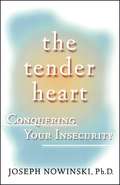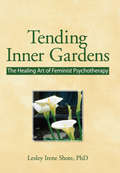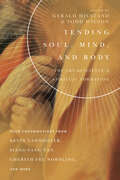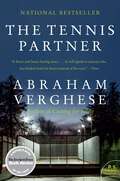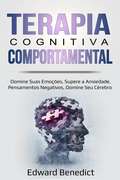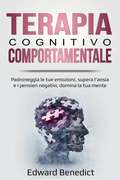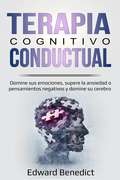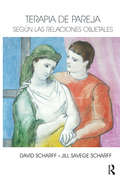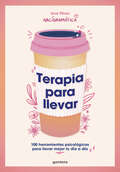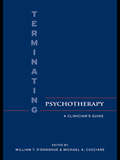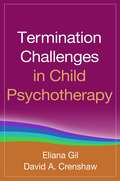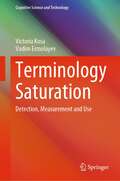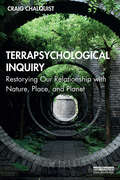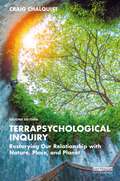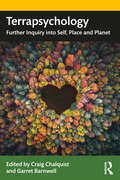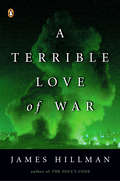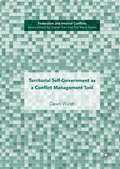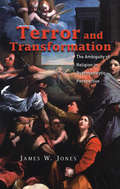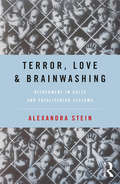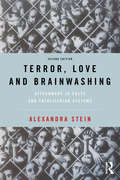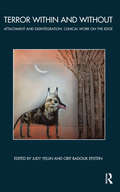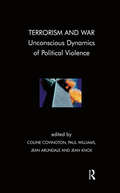- Table View
- List View
The Tender Heart
by Joseph NowinskiInsight, explanations, and practical solutions for overcoming insecurity and sensitivity -- from a top psychologist In simple language, Joseph Nowinski explains that insecurity is not a flaw or shortcoming, but rather a personality trait that reflects both temperament and life experiences. And, most important, he shows how insecurity can be conquered so that one can thrive -- especially in work and love. The first book to investigate insecurity, The Tender Heart sheds light on its common causes and provides guidelines for overcoming the self-doubt, debilitating self-consciousness, and chronic lack of confidence that prevent many people from enjoying life to its fullest. Combining personality quizzes and case histories of people who have conquered their insecurities, The Tender Heart offers expert advice on: Healing insecurity Avoiding emotional predators who seek out sensitive people Coping with a tough-hearted partner or colleague Finding your emotional mate Raising children who are self-confident The Tender Heart is for anyone who has experienced times when their own insecurity or the insecurity of others has interfered with valued relationships or prevented them from realizing their potential.
Tending Inner Gardens: The Healing Art of Feminist Psychotherapy
by Lesley I ShoreTending Inner Gardens: The Healing Art of Feminist Psychotherapy transforms the theory and practice of psychotherapy, one that values both the feminine and masculine perspectives. Set within a naturalistic framework, this model utilizes nature’s growing and healing processes. It proposes nature’s seasonal cycles as a model for the psychotherapy process, and author Lesley Irene Shore introduces nature’s seasonal cycle as a model for successful psychotherapy and demonstrates how to tune techniques to the rhythms of each season.Dr. Shore speaks with the voice of an experienced psychotherapist, sharing her struggles with therapeutic dilemmas and addressing issues common to every practitioner. She refuses to present simple solutions to the difficult process of helping people grow, yet offers new ways of thinking about this work. Readers will find this a healing book--for themselves as well as for their clients.The book covers relationship issues as well as the use of language, hypnosis, dreams, and creativity. Specific areas readers learn about include: language--teaches therapists to differentiate between questions that address conscious regions of the mind and ones which communicate with less conscious processes. metaphor--describes ways of working with metaphors to access less conscious processes trauma--explores the effects of psychological trauma and offers tools for healing its wounds psychotherapy process--uses nature’s seasonal cycle to chart the process of psychotherapyTending Inner Gardens transcends the artificial dichotomies currently characterizing much psychological thought. Psychotherapists will be interested in the natural model of psychotherapy which integrates a wide range of ideas and theories, especially the sections on the psychotherapy relationship, dreams, creativity, working with metaphors, language, and the process of psychotherapy. Interesting case studies illuminate this material. Students can benefit from seeing how the tools of psychotherapy are integrated with the art. Laypeople will enjoy reading about Dr. Shore’s personal evolution as a therapist, her life on Harmony Farm, and her cases, which are discussed in detail.While this book is primarily geared toward a professional audience, it attracts a wide range of readers. It should be read by experienced psychotherapists, faculty members, and practitioners, as well as those in training. This would generally include psychiatrists, psychologists, social workers, counselors, psychiatric nurses, and related professions. And while the book presents a primarily verbal, psychodynamic approach toward healing, its theoretical conceptualization will appeal to professionals in healing traditions such as art therapy, massage therapy, and expressive therapy.
Tending Soul, Mind, and Body: The Art and Science of Spiritual Formation (Center for Pastor Theologians Series)
by Todd Wilson Gerald Hiestand Gerald Hiestand, Todd WilsonThroughout his ministry, Jesus consistently demonstrated his concern and love for the whole person: soul, mind, and body.That task is carried forward today by pastors and church leaders, who are called to care for people in the midst of individual circumstances as well as seismic cultural shifts. How might that calling be informed by recent developments in psychology? How should the church attend to matters of mental health? How might psychology and counseling aid us in our spiritual formation?Based on the 2018 Center for Pastor Theologians conference, this volume brings together reflections by pastors, theologians, and psychologists who explore the relationships among three fields of study—theological anthropology, spiritual formation, and modern psychology. The result is a vibrant whole-person theology that can aid the church today in its centuries-old call to care for the soul, mind, and body.Based on annual CPT conferences, the volumes in the Center for Pastor Theologians series bring together the reflections of pastors and theologians who desire to make ongoing contributions to the wider scholarly community for the renewal of both theology and the church.
The Tennis Partner: A Doctor's Story of Friendship and Loss
by Abraham VergheseAn unforgettable, illuminating story of how men live and how they survive, from Abraham Verghese, the acclaimed New York Times bestselling author of Cutting for Stone and The Covenant of Water, an Oprah's Book Club Pick.“Heartbreaking. . . . Indelible and haunting, [The Tennis Partner] is an elegy to friendship found, and an ode to a good friend lost.”—The Boston GlobeWhen Abraham Verghese, a physician whose marriage is unraveling, relocates to El Paso, Texas, he hopes to make a fresh start as a staff member at the county hospital. There he meets David Smith, a medical student recovering from drug addiction, and the two men begin a tennis ritual that allows them to shed their inhibitions and find security in the sport they love and with each other. This friendship between doctor and intern grows increasingly rich and complex, more intimate than two men usually allow. Just when it seems nothing can go wrong, the dark beast from David’s past emerges once again—and almost everything Verghese has come to trust and believe in is threatened as David spirals out of control.
Terapia Cognitiva Comportamental: Domine Suas Emoções, Supere a Ansiedade, Pensamentos Negativos, Domine Seu Cérebro.
by Edward BenedictSe você sofre de qualquer tipo de doença mental, ansiedade, estresse, depressão, etc. Este é o livro que você deve receber. Ao contrário de outros livros, este livro tem analisado os diferentes comportamentos que as pessoas têm e como eles os afetam a ponto de lutar contra as doenças mentais. O livro foi adiante para dar conselhos e soluções ao leitor. Este é um livro que você poderá consultar de tempos em tempos. Ele lhe dá uma visão do que você deve fazer para que você possa viver uma vida livre da dor e da dor que você sente. Depressão e ansiedade são reais e estão em ascensão. Isto é porque muitas pessoas não foram equipadas com as habilidades certas para serem capazes de lidar com isso. Este é o objetivo deste ebook, fornecer ao leitor as habilidades relevantes que podem ajudá-los a conter o estresse e a depressão. Como? Fazendo uma extensa pesquisa e olhando as coisas de uma perspectiva diferente daquela a que você está acostumado. Este livro dará ao leitor uma visão de como fortalecer sua mente e como você pode mudar as histórias que você mesmo tem alimentado. Como um leitor pronto para aprender e saber mais sobre como a terapia cognitiva comportamental pode mudar sua vida, aqui estão alguns dos capítulos que você encontrará dentro de você. Dentro você vai encontrar Saia de si mesmo Quebra de conexões tóxicas Domine suas expectativas Largue as narrativas egocêntricas Mude a forma como você processa suas informações e muda sua vida Você pode se tornar um melhor juiz da realidade E muito mais....
Terapia Cognitiva para Trastornos de Ansiedad
by David A. Clark y Aaron T. BeckDurante las dos últimas décadas hemos presenciado un tremendo progreso en el conocimiento y tratamiento de los trastornos de ansiedad. Los enfoques derivados de la terapia cognitiva, particularmente, han logrado una base sustancial de apoyo empírico. En el presente libro, escrito por una autoridad contemporánea David A. Clark y por el pionero de la terapia cognitiva Aaron T. Beck, se sintetizan los últimos avances logrados en el campo y se presentan pautas actuales de práctica terapéutica basadas en los hallazgos más recientes. Otras características que hacen recomendable y manejable el libro son las síntesis, a modo de pequeños manuales, de los cinco principales trastornos de ansiedad, los aspectos clínicos concisos, los casos presentados con todo detalle y más de treinta cuestionarios y formularios que pueden emplearse en la práctica.En la Primera parte se actualiza y reformula el influyente modelo de los trastornos de ansiedad que Beck y sus colaboradores propusieron en 1985. Los autores aclaran las múltiples facetas de la ansiedad maladaptativa y del papel que desempeña la cognición en su desarrollo y mantenimiento. Sucintamente se revisan cientos de estudios empíricos que examinan las hipótesis del modelo. Sobre esta base se asienta la Segunda parte, la cual detalla las principales estrategias clínicas cuyo alcance es transdiagnóstico -efectivo y relevante para cualquier tipo de presentación de los síntomas de ansiedad. En esta parte se describen, paso a paso, el modo de dirigir la valoración, de formular los casos individuales y de implementar la reestructuración cognitiva y las intervenciones conductuales. La Tercera parte se destina más específicamente a los trastornos más prevalentes: el trastorno de angustia, el trastorno obsesivo-compulsivo y el trastorno por estrés postraumático. Los datos específicos de cada trastorno, las conceptualizaciones y los protocolos de tratamiento ofrecen al terapeuta recursos de gran valor para poder satisfacer las necesidades de cada paciente. La combinación de la profundidad académica con la inclusividad de la utilidad práctica convierte, este libro en una referencia esencial para los profesionales de la salud mental y para los investigadores de todas las áreas. Es una obra de incalculable valor para seminarios y cursos de psicología clínica, psiquiatría, psicoterapia y asistencia social.Dr. David A. Clark es profesor de Psicología en la Universidad de New Brunswick, Canadá. Ha publicado siete libros y más de 100 artículos y capítulos monográficos sobre varios aspectos de la teoría cognitiva y la terapia de la depresión y de los trastornos de ansiedad. El Dr. Clark es miembro de la Asociación Canadiense de Psicología, miembro fundador de la Academia de la Terapia Cognitiva y ha sido galardonado con el premio Aaron T. Beck que la Academia le ha concedido por sus constantes e importantes contribuciones a la terapia cognitiva. Es editor asociado de la revista International Journal of Cognitive Therapy y además sigue practicando la psicología clínica en su consulta privada.Dr. Aaron T. Beck es profesor emérito de Psiquiatría en la Escuela de Medicina de la Universidad de Pensilvania y fundador de la terapia cognitiva. Ha publicado 21 libros y más de 540 artículos en revistas profesionales y científicas. El Dr. Beck ha sido galardonado con numerosos premios entre los que se incluyen el Premio Albert Lasker a la investigación médica clínica en 2006, el premio al recorrido profesional a lo largo de la vida de la Asociación Americana de Psicología en 2007, el premio a los servicios prestados de la Asociación Americana de Psiquiatría en 2008 y el premio de la Fundación Robert J. y Claire Pasarow por la Investigación en Neuropsiquiatría en 2008. Es presidente del Instituto Beck de Terapia e Investigación Cognitiva y presidente honorario de la Academia de Terapia Cognitiva.
Terapia Cognitivo-Comportamentale: Padroneggia le tue emozioni, supera l’ansia e i pensieri negativi, domina la tua mente.
by Edward BenedictSe si soffre di qualsiasi tipo di malattia mentale, ansia, stress, depressione e così via, questo è il libro che dovreste leggere. A differenza di altri, questo libro ha esaminato i diversi comportamenti delle persone e il modo in cui influenzano gli altri al punto da avere difficoltà con malattie mentali. Il libro continua dando consigli e soluzioni al lettore. Questo è un libro a cui si può far riferimento di tanto in tanto. Dà un’idea di ciò che dovresti fare per poter vivere una vita libera dalla sofferenza e dal dolore che si prova. La depressione e l’ansia sono reali e sono in aumento. Questo perché molte persone non sono dotate delle giuste competenze per poterle affrontare. Questo è l’obiettivo di questo E-book, fornire al lettore le competenze rilevanti per aiutarlo a contenere stress e depressione. In che modo? Effettuando ricerche approfondire e guardando le due cose da una prospettiva diversa da quella a cui si è abituati. Questo libro darà al lettore un’idea di come potenziare la propria mente e darà uno sguardo su come si possono cambiare le storie di cui ci si è nutriti. Come lettore pronto ad imparare e conoscere meglio di come la terapia cognitivo comportamentale possa cambiare la propria vita, ecco alcuni dei capitoli che si trovano all’interno. All’interno troverete: Uscire dalla propria bolla Rompere i rapporti tossici Gestire le proprie aspettative Liberarsi dalla narrazione egocentrica Cambiare l’elaborazione delle proprie informazioni e cambiare la propria vita Giudicare meglio la realtà E molto di più…
Terapia Cognitivo Conductual: Domine sus emociones, supere la ansiedad o pensamientos negativos y domine su cerebro
by Edward BenedictSi padeces alguna enfermedad psíquica, como ansiedad, estrés, depresión u otra, deberías obtener este libro. A diferencia de otros, este libro examina los distintos comportamientos que tienen las personas y cómo estos les afectan causándoles problemas con enfermedades mentales. Esta publicación se realiza para dar consejo y solución a sus lectores. Este es un libro al que podrá referirse de vez en cuando. Le dará a usted un análisis de lo que debería hacer para comenzar a vivir una vida libre del dolor y daño que siente. La depresión y la ansiedad son reales y hoy en día van en aumento, lo cual se debe a que muchas personas no han sido inculcadas con habilidades apropiadas para lidiar con ellas. El objetivo de este libro es exactamente este: proveer al lector habilidades relevantes para impulsar su reducción el estrés y la depresión. ¿Cómo? Llevando a cabo una investigación extensa y percibiendo los fenómenos desde una perspectiva distinta a la cual se acostumbra. Esta publicación dará a sus lectores conocimientos sobre cómo dar poder a sus mentes y otorgar una perspectiva sobre cómo modificar las narrativas que cada quien se entrega a sí mismo/a. Al lector/a que está dispuesto a aprender y conocer más sobre cómo la terapia cognitivo conductual puede cambiar vidas, aquí se presentan algunos capítulos a abordar: Dentro del libro encontrarás: Salir de uno mismo/a Romper conexiones tóxicas Dominar nuestras expectativas Dejar las narrativas autorreferentes Cambiar nuestra forma de procesar la información y nuestras vidas Volverse un mejor juez de realidades Y mucho más…
Terapia de Pareja Según las Relaciones Objetales
by David E. Scharff Jill Savege ScharffEn este libro que marcará todo un hito, David y Jill Scharff, ambos psicoanalistas, desarrollan una manera de pensar y trabajar con la pareja como un pequeño grupo de dos personas quienes se mantienen en un sistema estrechamente unido por un compromiso que es poderosamente reforzado por un lazo de placer mutuo.
Terapia para llevar: 100 herramientas psicológicas para llevar mejor tu día a día
by Nací DramáticaLa salud mental no cae del cielo. Descubre 100 herramientas prácticas y fáciles de aplicar que mejorarán tu día a día. ¿Estás desconectado de ti mismo? ¿Sientes que te pasa algo, pero no sabes qué es? ¿La opinión de los demás te condiciona demasiado?Descubre 100 herramientas prácticas y fáciles de aplicar para vivir mejor tu día a día. Aprende a relativizar, a evitar los pensamientos intrusivos y a poner límites que te hagan sentir bien. Descubre cómo aumentar tu autoestima, dejar de procrastinar y confiar más en ti. Gestiona el fracaso, el miedo al futuro y la peor de las rupturas amorosas.En definitiva, escúchate, entiende tus emociones y, sobre todo, actúa para mejorarlas. Te ha costado años conocer a las personas de tu alrededor. Conocerte a ti también te llevará tiempo.
Teresa, My Love: An Imagined Life of the Saint of Avila (To The Point)
by Julia KristevaMixing fiction, history, psychoanalysis, and personal fantasy, Teresa, My Love turns a past world into a modern marvel, following Sylvia Leclercq, a French psychoanalyst, academic, and incurable insomniac, as she falls for the sixteenth-century Saint Teresa of Avila and becomes consumed with charting her life. Traveling to Spain, Leclercq, Julia Kristeva's probing alter ego, visits the sites and embodiments of the famous mystic and awakens to her own desire for faith, connection, and rebellion. One of Kristeva's most passionate and transporting works, Teresa, My Love interchanges biography, autobiography, analysis, dramatic dialogue, musical scores, and images of paintings and sculpture to engage the reader in Leclercq's—and Kristeva's—journey. Born in 1515, Teresa of Avila outwitted the Spanish Inquisition and was a key reformer of the Carmelite Order. Her experience of ecstasy, which she intimately described in her writings, released her from her body and led to a complete realization of her consciousness, a state Kristeva explores in relation to present-day political failures, religious fundamentalism, and cultural malaise. Incorporating notes from her own psychoanalytic practice, as well as literary and philosophical references, Kristeva builds a fascinating dual diagnosis of contemporary society and the individual psyche while sharing unprecedented insights into her own character.
Terminating Psychotherapy: A Clinician's Guide
by William T. O’donohueThe topic of terminating therapy is not one that clinicians normally consider. However, the session limits placed on clinicians by managed care require that the end of therapy be built into the treatment plan from the onset. With a focus on the termination of psychotherapy, A Clinician’s Guide examines the pertinent additional training that will aid mental health professionals in providing the most financially sensible and clinically deep treatment for their clients. Specifically, the book provides information on how to identify and understand when and how to discontinue psychological treatment with clients who have achieved sub-par results, as well as with clients who have ulterior motives such as friendship or support. The volume examines how to identify the client’s motivations early in therapy in order to better plan the course of treatment and to effectively prepare for "unplanned" terminations. It supplies important additional training in its discussions on ethical dilemmas, financial and personal consequences, and troubleshooting when it comes to engaging in termination. Offering a comprehensive and practice-focused guide from distinguished contributors, the book covers a wide spectrum of therapy approaches, patient populations and termination strategies. The book provides an in-depth look at termination by discussing various patient models, types, backgrounds, and problems, noting that with clear goals and a set course of action, the therapist will be better equipped to design a treatment that will best serve the patient’s interest.
Termination Challenges in Child Psychotherapy
by Eliana Gil David A. CrenshawEnding therapy in an appropriate and meaningful way is especially important in work with children and adolescents, yet the topic is often overlooked in clinical training. From leading child clinicians, this much-needed book examines the termination process/m-/both for brief and longer-term encounters/m-/and offers practical guidance illustrated with vivid case material. Tools are provided for helping children and families understand termination and work through associated feelings of loss and grief. Challenges in creating positive endings to therapy with children who have experienced trauma and adversity are given particular attention. Several reproducible forms can be downloaded and printed from the companion website in a convenient 8 1/2" x 11" size. This e-book edition features nine full-color figures. (Figures will appear in black and white on black-and-white e-readers).
Terminology Saturation: Detection, Measurement and Use (Cognitive Science and Technology)
by Vadim Ermolayev Victoria KosaThis book highlights an innovative approach for extracting terminological cores from subject domain-bounded collections of professional texts. The approach is based on exploiting the phenomenon of terminological saturation. The book presents the formal framework for the method of detecting and measuring terminological saturation as a successive approximation process. It further offers the suite of the algorithms that implement the method in the software and comprehensively evaluates all the aspects of the method and possible input configurations in the experiments on synthetic and real collections of texts in several subject domains. The book demonstrates the use of the developed method and software pipeline in industrial and academic use cases. It also outlines the potential benefits of the method for the adoption in industry.
Terrapsychological Inquiry: Restorying Our Relationship with Nature, Place, and Planet
by Craig ChalquistTerrapsychological Inquiry is a qualitative research methodology seeking a form of inquiry that takes seriously our intense inner responses to the state of the natural world. Terrapsychology is a theory and practice approach that studies, from the standpoint of lived experience, how the world gets into the heart. Oceans and skies, trees and hills, rivers and soils, and even built things like houses, cities, ports, and planes: How do they show up for us inwardly? How do our moods, feelings, and dreams reflect what happens in the world? Terrapsychological Inquiry evolved over a decade of experimentation by graduate students, instructors, workshop leaders and presenters, and other embodied creatives to offer a truly Earth-honoring mode of story-based qualitative inquiry, one that changes all involved from passive spectators of the doings of the world into active, sensitive participants. Learn how to use this methodology of reenchantment in a variety of settings inside and outside academia, and by doing so reenter an animate world. Written in an engaging and accessible style, this introduction to a new research methodology will be of great interest to students and scholars of environmental psychology, ecotherapy, and environment and sustainability studies more generally.
Terrapsychological Inquiry: Restorying Our Relationship with Nature, Place, and Planet
by Craig ChalquistTerrapsychological Inquiry is a path of storied, imaginative research that takes seriously our intense inner responses to the state of the natural world. This place-rooted approach studies, from the standpoint of lived experience, how the world gets into the heart. Oceans and skies, trees and hills, rivers and soils, and even built things like houses, cities, ports, and planes: How do they show up for us inwardly? How do our moods, feelings, and dreams reflect what happens in the world? Terrapsychological Inquiry evolved over a decade of exploration by graduate students, instructors, ceremonialists, workshop leaders and presenters, and other practitioners of embodied creativity to offer an Earth-honoring mode of storied qualitative inquiry, one that transforms all involved from passive spectators of the doings of the world into active, sensitive participants. Learn how to use this methodology of earthly reenchantment in a variety of settings inside and outside academia and by doing so reenter an animate world. This new edition has been revised throughout and offers fresh insights into how Terrapsychological Inquiry, a field with roots in depth psychology, ecopsychology, and Hermetic philosophy, can also be used as an ecospiritual path. Thoroughly updated with a new chapter and added discussion questions and exercises at the end of each chapter, this introduction to an evolving research methodology will be of great interest to students and scholars of environmental psychology, ecotherapy, and environment and sustainability studies more generally.
Terrapsychology: Further Inquiry into Self, Place and Planet
by Craig Chalquist Garret BarnwellReflecting on and exploring the connection between the environments in which we live and our moods, motivations and dreams, this insightful volume takes the growing field of terrapsychology into new and exciting directions. This book draws together a group of contemporary voices in terrapsychology to explore lived topics, such as ecotransference encountered with sacred place, alternative mapping and expressions of solidarities with sacred sites, place dreaming, locianalysis, trans-species encounters, deep genealogy, terraplomacy and Hermeticism. The chapters focus on praxis, demonstrating how each author’s relationship with the more-than-human world has been reenchanted, revealing, remembering and co-creating relationships and community for life to flourish. Co-edited by Craig Chalquist and Garret Barnwell this collection will interest scholars, students and practitioners across a range of fields, including analytical psychology, environment psychology, and cultural anthropology.
Terrapsychology: Further Inquiry into Self, Place and Planet
by Craig Chalquist Garret Barnwell- The place of nature and environment is increasingly recognized in therapeutic theory and practice. - Co-edited by the originator of the theory of Terrapsychology. - Builds on his successful 2020 title, Terrapsychological Inquiry, which we also published.
A Terrible Love of War
by James HillmanWar is a timeless force in the human imagination—and, indeed, in daily life. Engaged in the activity of destruction, its soldiers and its victims discover a paradoxical yet profound sense of existing, of being human. In A Terrible Love of War, James Hillman, one of today’s most respected psychologists, undertakes a groundbreaking examination of the essence of war, its psychological origins and inhuman behaviors. Utilizing reports from many fronts and times, letters from combatants, analyses by military authorities, classic myths, and writings from great thinkers, including Twain, Tolstoy, Kant, Arendt, Foucault, and Levinas, Hillman’s broad sweep and detailed research bring a fundamentally new understanding to humanity’s simultaneous attraction and aversion to war. This is a compelling, necessary book in a violent world.
Territorial Self-Government as a Conflict Management Tool (Federalism and Internal Conflicts Ser.)
by Dawn WalshThis book provides an in-depth narrative of the difficulties facing Territorial Self-Government institutions across Northern Ireland, Bosnia, the former Yugoslav Republic of Macedonia, Moldova, and Iraq. It brings together analyses of both prominent and lesser known cases to provide a broad overview of how Territorial Self-Government operates as a conflict management tool in different contexts. Drawing on lessons from these five cases, the author demonstrates the importance of designing and implementing international guarantees to self-government and the associated difficulties. Domestic capacity development must be encouraged and international actors needs to balance the guarantees aimed at providing stability with their wider security and economic concerns. The volume also strongly connects to broader research and theory on conflict management, particularly the role of institutional design and international assistance.
Terror and Transformation: The Ambiguity of Religion in Psychoanalytic Perspective
by James W. JonesReligion has been responsible for both horrific acts against humanity and some of humanity's most sublime teachings and experiences. How is this possible? From a contemporary psychoanalytic perspective, this book seeks to answer that question in terms of the psychological dynamic of idealisation.At the heart of living religion is the idealisation of everyday objects. Such idealisations provide much of the transforming power of religious experience, which is one of the positive contributions of religion to the psychological life. However, idealisation can also lead to religious fanaticism which can be very destructive. Drawing on the work of various contemporary relational theorists within psychoanalysis, this book develops a psychoanalytically informed theory of the transforming and terror-producing effects of religious experience. It discusses the question of whether or not, if idealisation is the cause of many of the destructive acts done in the name of religion, there can be vital religion without idealisation.This is the first book to address the nature of religion and its capacity to sponsor both terrorism and transformation in terms of contemporary relational psychoanalytic theory. It will be invaluable to students and practitioners of psychoanalysis, psychotherapy, psychology and religious studies, and to others interested in the role of religion in the lives of individuals and societies.
Terror, Love and Brainwashing: Attachment in Cults and Totalitarian Systems
by Alexandra SteinWritten by a cult survivor and renowned expert on cults and totalitarianism, Terror, Love and Brainwashing draws on the author’s 25 years of study and research to explain how almost anyone, given the right set of circumstances, can be radically manipulated to engage in otherwise incomprehensible and often dangerous acts. Illustrated with compelling stories from a range of cults and totalitarian systems, from religious to political to commercial, the book defines and analyses the common and identifiable traits that underlie almost all these groups. It focuses on how charismatic, authoritarian leaders control their followers’ attachment relationships via manipulative social structures and ideologies so that, emotionally and cognitively isolated, they become unable to act in their own survival interests. Using the evolutionary theory of attachment to demonstrate the psychological impact of these environments, and incorporating the latest neuroscientific findings, Stein illustrates how the combined dynamic of terror and ‘love’ works to break down people’s ability to think and behave rationally. From small local cults to global players like ISIS and North Korea, the impact of these movements is widespread and growing. This important book offers clarity and a unique perspective on the dynamics of these systems of control, and concludes with guidance to foster greater awareness and prevention. It will be essential reading for mental health professionals in the field, as well as policy makers, legal professionals, cult survivors, and their families, as well as anyone with an interest in these disturbing groups. Students of social and developmental psychology will also find it fascinating.
Terror, Love and Brainwashing: Attachment in Cults and Totalitarian Systems
by Alexandra SteinThis book explains how people can be radically manipulated by extreme groups and leaders to engage in incomprehensible and often dangerous acts through psychologically isolating situations of extreme social influence. These methods are used in totalitarian states, terrorist groups and cults, as well as in controlling personal relationships. Illustrated with compelling stories from a range of cults and totalitarian systems, Stein's book defines and analyses the common identifiable traits that underlie these groups, emphasizing the importance of maintaining open yet supportive personal networks. Using original attachment theory-based research this book highlights the dangers of closed, isolating relationships and the closed belief systems that justify them, and demonstrates the psychological impact of these environments, ending with evidence-based recommendations to support an educational approach to awareness and prevention. Featuring a foreword by John Horgan, the new edition has been fully updated to include recent work on political extremism and radicalization and totalitarian systems, as well as the recent highly publicized NXIVM case. Terror, Love and Brainwashing, second edition is essential reading for professionals, policy makers, legal professionals, educators and cult survivors and their families themselves.
Terror Within and Without: Attachment and Disintegration: Clinical Work on the Edge (The Bowlby Centre Monograph Series)
by Orit Badouk-Epstein Judy YellinThis book explores the experiences of terror states in the consulting room. It examines how we might more adequately provide support and legitimacy within the profession for work 'on the edge', and explores the means by which individuals struggle to cope with exposure to war zones.
Terrorism and War: Unconscious Dynamics of Political Violence
by Coline Covington Paul Williams Jean Arundale Jean Knox Lord John AlderdiceFollowing the attacks of September 11th 2001, one of the resounding questions asked was "What would make anyone do such a thing?" The psychological mentality of the suicidal terrorist left a gaping hole in people's understanding. This essential volume represents a much-needed effort to collate and examine some of the material already at our disposal as an encouragement to serious thought on this question and other related questions.'If terrorism is not new, what is it about the recent attacks that gives us a sense that something has changed? Is it the scale of the destruction, or the anxiety that we are facing some altogether new uncertainty? Are we in some sense facing a new enemy? ...In reflecting on these and other related questions we may be facing a similar watershed of understanding to that faced by Freud at the end of the Great War...In the absence of progress in our thinking today, political leaders and public opinion will likely turn to previous political and religious ideas, investing in them with a fundamentalist certainty that spells disaster.
